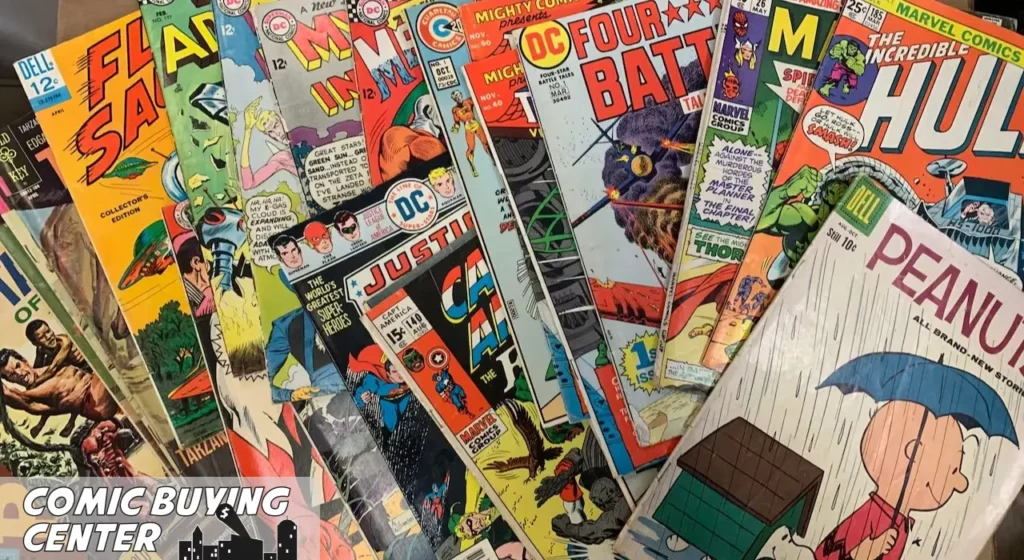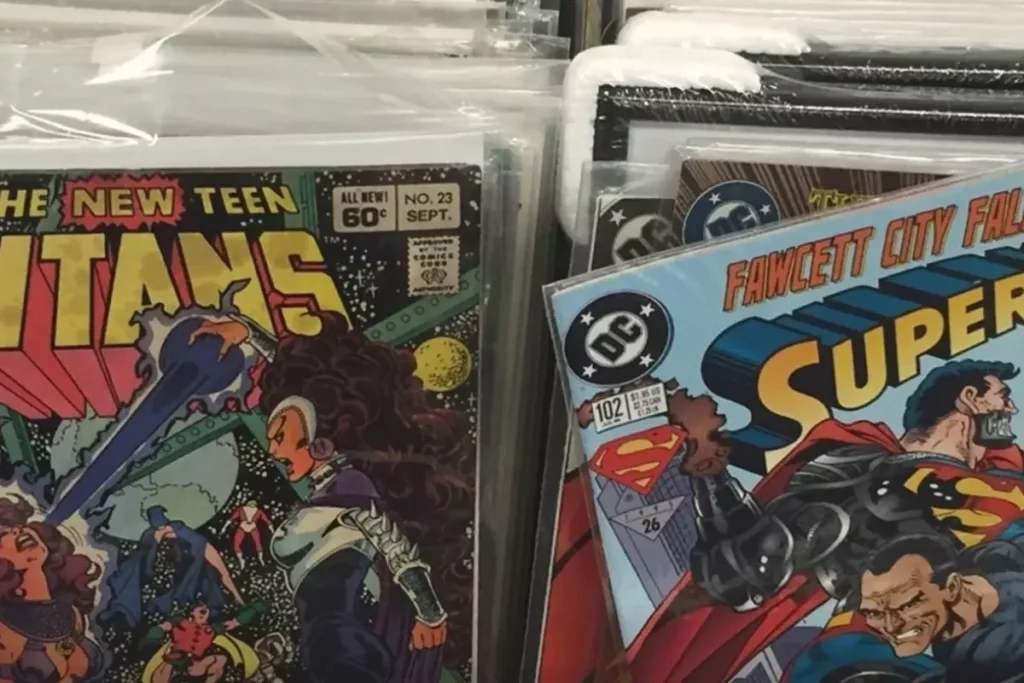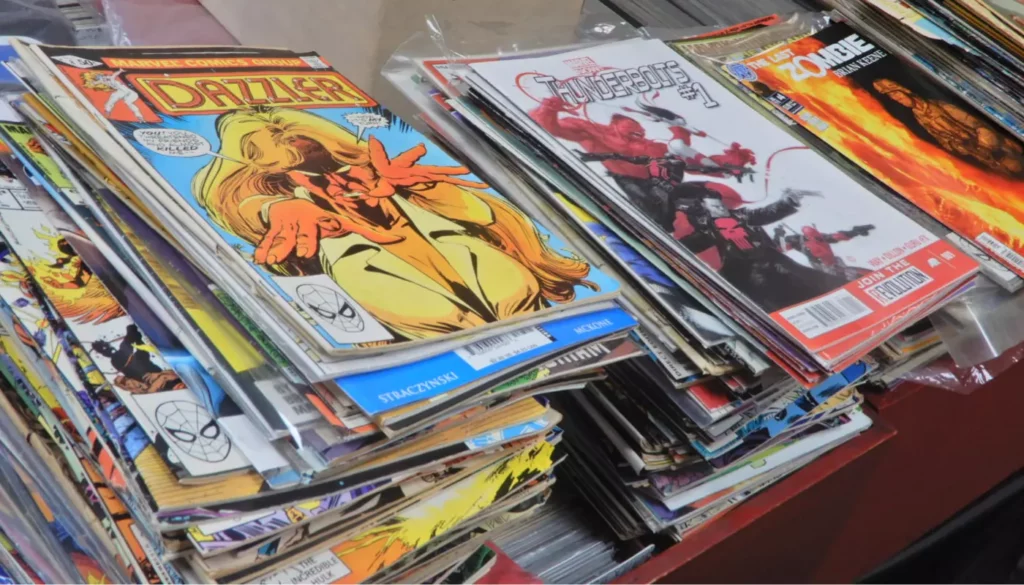The article will provide a beginner’s guide to starting a comic book collection. It will cover topics such as where to find comic books, how to evaluate their condition and value, tips for organizing and storing them, and advice on budgeting and prioritizing purchases.
How To Start Collecting Comic Books
Starting in comic book collecting can be both exciting and challenging. It’s a hobby that allows you to become a part of a world of heroes, villains, and thrilling stories. To begin, it’s wise to start slowly, picking up issues that catch your interest or that hold sentimental value. Collecting comic books isn’t just about quick profits. It’s about the joy of gathering pieces of art and storytelling that vibe with you.
While the process can be daunting at times because there are just so many options available. Moreover, comic book collecting can potentially be profitable if done wisely, considering the market values and demand for certain editions. If done wisely, with time you will be able to sell comic books and get an actual profit.
Remember, there are a few simple steps to help starting your collection, and understanding these can make collecting comic books more enjoyable and fulfilling.
Get Familiar with Popular Artists and Writers
When starting collecting comics, the first thing is to learn about the renowned artists and writers who have shaped iconic characters and storylines. This knowledge can guide your decisions in building a meaningful collection. Popular artists and writers often have a significant following, and their works can be valuable in the community.
Understanding the impact of these creators can help you spot issues that may not only grow in value but can simply be pleasant to read. As you get familiar with different styles and narratives, you’ll find that collecting comics may be rewarding, both emotionally and financially.
Buy Only Paper Comic Books
When starting a comic book collection, focusing exclusively on paper comic books is a strategic choice. Unlike digital copies, paper comics can possess actual collectible value. Digital comics, while convenient and easy to store on devices like phones or tablets, usually come with a “not for resale” clause and do not hold any resale value. While paper comics can become rare over time, especially if they feature iconic artwork, stories, or first appearances of characters. These physical copies can appreciate in value, making them not just a hobby but potentially an investment. So, for collectors looking to not only enjoy their best comics to collect but also potentially profit from them in the future, sticking to paper comic books is advisable.
Hunt for Comics in Other Places Besides a Comic Book Shop
When looking to start your comic collection, consider something different rather than the traditional comic book shops. There are numerous other places where you can find valuable issues. Specialized online forums are a great resource, as they often feature sales sections where collectors sell or trade issues. Estate sales, garage sales, and flea markets can sometimes yield rare comics forgotten in boxes. It may all sound like a waste of time, but sometimes you can find an actual gem in most unexpected places.
Network with Other Comic Book Collectors
By connecting with other comic book collectors, you can gain insights, swap stories, and , most importantly, share valuable information about rare finds and market trends. Engaging with a community of comic book collectors also provides opportunities to trade issues, diversifying your collection. Whether through online forums, local collector comic book clubs, or comic conventions, building relationships within the community can open up access to comics you might not find elsewhere. It’s also a great way to stay updated on the latest releases and potentially valuable issues.
Attend Comic Cons
Attending comic cons is a fantastic way to get even more comics to collect. These events bring together fans, artists, and vendors, offering a unique opportunity to discover a ton of comics – from rare vintage issues to the latest releases. At comic cons, you can also participate in panels and meet-and-greets, where you can gain insights from industry professionals and long-time collectors. You can exchange knowledge, find comics that are hard to come by, and even snag deals directly from other collectors and specialized dealers. Whether you’re a professional collector or just starting, comic cons are invaluable for anyone interested in comics.
Search for Comic Books Online
Searching for comic books online is a practical step in comic book collecting for beginners. The internet offers a lot of resources where you can find comics ranging from rare vintage editions to the latest issues. Online marketplaces, auction sites, and specialized comic book stores provide platforms where you can browse extensive collections from the comfort of your home. Additionally, online forums and social media groups dedicated to comic book enthusiasts are valuable for gaining insights, receiving recommendations, and connecting with sellers and other collectors directly.
Know the Grading System
Understanding the grading system is really important when looking for the best comic books to collect. The grading system evaluates the condition of a comic book, which is one of the key things that influences its value. By knowing how to assess the condition of comics based on this system, you can make more informed decisions, ensuring that you pay a fair price for each item.
Being familiar with this system also protects you against scams, as you’ll be less likely to overpay for a comic that doesn’t match its advertised condition. This knowledge is particularly valuable for beginners, who may be more vulnerable to such pitfalls. Learning about grades, from mint condition to poor, helps you build a more valuable collection.
Search for Key Issues
Searching for key issues is a wise strategy for anyone looking to get a collection of the best comic books. Key issues might include first appearances of popular characters, landmark storylines, or the debut works of notable artists and writers. These comics are not only great for their historical and artistic importance but also tend to appreciate in value, making them excellent investments.
Familiarize yourself with comic book history to identify these key editions and keep an eye on market trends to understand what collectors are currently seeking. By targeting key issues, you’re more likely to build a respected and worthwhile collection that includes the best that the comic book world has to offer.
Flip Modern Key Issues
Flipping modern key issues can improve collecting comics, especially if you’re focused on the investment aspect. This involves buying new, popular comics that are likely to increase in value quickly and selling them while the demand is high. To succeed, stay informed about upcoming releases and industry trends to identify which issues are generating lots of buzz.
Understanding the market and timing your sales can maximize returns and fund further expansions of your collection. This strategy requires staying active in comic communities and frequently updating your knowledge to spot the next big hit.
What’s the difference between a comic book, graphic novel and trade paperback?
Understanding the differences between comic books, graphic novels, and trade paperbacks can help you effectively build and manage your comic book collections.
Comic Books are typically thin magazines published regularly, like monthly or bi-monthly. Each issue is part of a larger story or series, and they are often collected later into larger volumes.
Graphic Novels are similar to novels in structure and are usually standalone stories with more complex narratives. They are published as single books with complete stories, which may or may not be part of a series. Graphic novels are bound like traditional books, with thicker covers and often higher quality paper than comic books.
Trade Paperbacks (often abbreviated as TPB) are collections of comic books that compile an arc or series of issues from regular comic book runs into one volume. They make it easier for readers to enjoy a full story without tracking down individual issues, and are also printed on better paper with more durable binding.
What does “speculation” and “key issue” mean?
If we talk about comics, “speculation” refers to the practice of purchasing comics with the expectation that they will increase in value over time. Collectors who speculate typically buy issues that they believe will become more expensive, either due to story developments, character introductions, or other factors that might catch the interest of the broader market.
A “key issue” is a term used to describe a comic book that is considered highly valuable due to its content. This could be the first appearance of a character, a key plot twist, or a renowned creator’s contribution. Key issues are often the target of speculation because their significant content makes them more likely to appreciate in value over time.
Why are comics so valuable?
Comics can be incredibly valuable, primarily due to their cultural significance, rarity, and the demand from collectors. The most expensive comics are often those that feature major historical milestones, such as the first appearances of iconic characters, landmark story arcs, or works by renowned creators. These elements make a comic highly valuable for collectors.
Moreover, the value of comics is heavily influenced by basic market dynamics of supply and demand. When there is a high demand for specific issues, and the supply is limited – often because older comics become rarer over time – the prices increase. Essentially, expensive comics are costly primarily because people believe they are worth that much and are willing to pay for them. As collectors look for these rare items, their market value continues to climb, making them highly valuable investments for some.
How much should I spend?
Starting a comic book collection doesn’t require a massive investment upfront. It’s wise to start small and within your budget to avoid financial strain. Setting a budget and sticking to it should be your first step. This means buying a few items that genuinely interest you and stepping back when necessary to manage your spending.
It’s important to buy what you love, which will ensure that your collection brings you joy and satisfaction, rather than just being a risky financial investment. Whether you’re drawn to the stories, the artwork, or specific characters, these elements should guide your decisions. By focusing initially on one comic series or character, you can prevent feeling overwhelmed and maintain a clear focus.
Taking care of your collection properly by using archival-quality storage materials and handling your comics minimally will help preserve their condition and value over time. Understanding the grading system is also important, especially if you’re considering comic book collecting for investment purposes.
All in all, enjoy the process of collecting, explore various resources and communities, and expand your collection at a comfortable, your own pace that aligns with your personal interests and financial capabilities.
What’s the difference between raw and graded values?
When it comes to comic books to look out for, the terms “raw” and “graded” refer to the condition and valuation of comic books. Raw comics are those that have not been officially graded. They are simply as-is from purchase, without any professional assessment. Raw comics may vary significantly in value depending on their visible condition, but assessing their exact worth can be subjective without professional grading.
Graded comics, on the other hand, have been evaluated by professional grading companies like CGC (Certified Guaranty Company) or CBCS (Comic Book Certification Service). These comics are given a numerical grade based on their condition and are sealed within protective casing. The grading process standardizes the comic’s condition, making its value more definitive and generally higher compared to raw copies. Graded comics often fetch a higher price in the market due to this certainty and protection, leading to a notable financial difference between graded and raw comics.
Collectors that see comics as an investment typically prefer graded comics, as they offer a clearer understanding of the comic’s condition and maintain their integrity over time.




